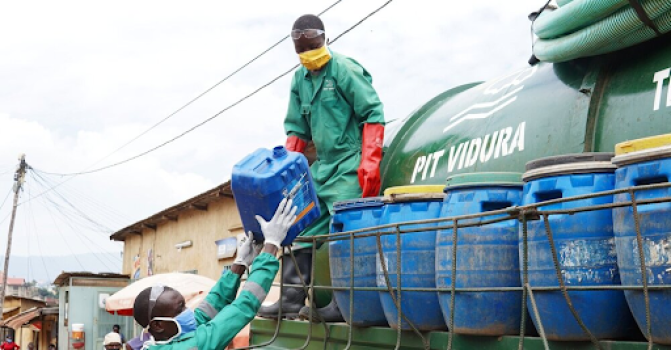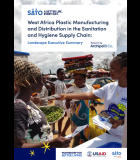Private Sector Contributions to SDG6: Fostering Sanitation Business Success

This learning event focused on how USAID has partnered with the private sector to catalyze solutions to achieve SDG 6 by 2030: universal access to adequate and equitable sanitation and hygiene and ending open defecation, paying special attention to the needs of women and girls and those in vulnerable situations.
This event was hosted jointly by USAID partners, The Toilet Board Coalition and LIXIL, bringing to life the ways in which the private sector is contributing to SDG 6 and strengthening USAID’s water security, sanitation, and hygiene programming.
The event started with an introduction to the panel, followed by interactive breakout sessions in which panelists answered questions and facilitated discussions between a variety of private sector actors and participants.
The following is an overview of the breakout discussions:
Room 1: USAID perspective
Room 1 welcomed Chigozie Okwu, Environmental Officer for USAID/India, and Oliver Subasinghe, Policy & Partnerships Advisory USAID, speaking about private sector partnerships that USAID has established to advance progress in water security and sanitation. The two partnerships discussed were Partnerships for Better Living with LIXIL, to build sustainable supply chains and unlock sanitation markets, and the partnership with the Toilet Board Coalition, supporting small and medium-sized enterprises (SMEs) - accelerating business solutions in response to the sanitation crisis. The breakout room came to a close speaking about how each partnership is unique and what each brings to the sanitation marketplace.
Room 2: SME perspective
The SME perspective was represented by TBC Accelerator alumni, Nicholas Kuria, General Manager at Pit Vidura. Team members from the Toilet Board Coalition, Lindelani Xaba, Accelerator & Pipeline Manager, and Venu Gupta, Accelerator Managing Director, shared their experience working closely with entrepreneurs on a daily basis. The discussion focused on how sanitation SMEs can be supported, including internal and external factors. Nicholas spoke about his growth trajectory, and Venu and Lindelani shared learnings from the Accelerator and their perspectives on current business solutions in the industry, based on the pipeline of SMEs that apply to the Accelerator each year.
Room 3: Multinational corporation perspective
Room 3 shared a multinational perspective welcoming Sam Langat, Leader Africa, SATO at LIXIL, and Erin McCusker, Senior Vice President, Leader, SATO and LIXIL Public Partners, LIXIL. They spoke about the work SATO does in understanding customer needs and gaps in the market, generating innovative product solutions, and building sustainable supply chains. The speakers emphasized that where there is a need, there is an affordable, accessible, and aspirational solution to accelerate progress toward addressing sanitation and hygiene challenges. The award with USAID, Partnership for Better Living, specifically aims to build these supply chains and unlock sanitation markets. The breakout room introduced a discussion around the partnership and how to navigate the import and export of goods and some of the barriers faced. The group raised topics such as, looking at SDG 6 holistically, in terms of the sanitation economy; building local capacity; and SATO’s role in innovating and introducing solutions and products.
Discussion Leads:
- Erin McCusker, Senior Vice President, LIXIL | SATO and LIXIL Public Partners Lead
- Alex Knezovich, Managing Director Engagement, Toilet Board Coalition
- Sam Langat, Africa Lead, SATO at LIXIL
- Chigozie Okwu, USAID/India
- Lindelani Xaba, Accelerator and Pipeline Manager, Toilet Board Coalition
- Nicholas Kuria, General Manager, Pit Vidura





